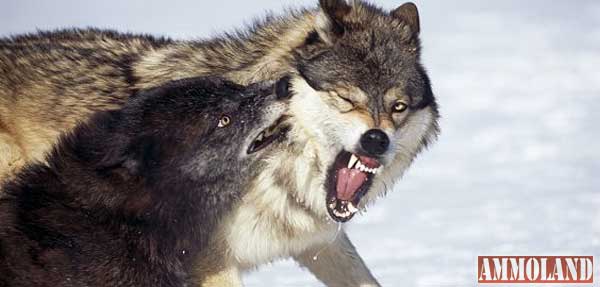

Columbus, OH –-(Ammoland.com)- The legal status of wolves, the state management of wolves, and the hunting of wolves has once again become one of the biggest topics in the sportsmen’s community as anti-hunting organizations have started filing or threatening a barrage of lawsuits against state agencies and the federal government.
Here is a quick guide to what’s going on with the Western Great Lakes region wolves at the federal level and in the states.
History of Wolves in the Western Great Lakes Region:
In 1974, wolves in the lower 48 states were listed as endangered under the federal Endangered Species Act (ESA). Since that time, wolves in the Western Great Lakes region, consisting of Michigan, Minnesota, Wisconsin, and some portions of adjoining states, have been one of the country’s biggest success stories. Wolf numbers in those areas have exploded past population goals set by the U.S. Fish and Wildlife Service.
Recognizing that wolves had far exceeded the recovery goals needed for keeping them as listed under the ESA, both the Bush Administration (in 2007) and the Obama Administration (in 2009) moved to remove wolves from the ESA and return them to state management.
Both attempts were met with lawsuits filed by the Humane Society of the United States (HSUS) to overturn the delisting efforts. The U.S. Sportsmen’s Alliance Foundation (USSAF) and its partners intervened in those cases to uphold the delisting. Federal courts have unfortunately stopped both delisting attempts based on legal technicalities but not based on the recovery of the wolves.
In 2010, USSAF and its partners petitioned the Service to start the long-overdue delisting process again. In response, the Service announced in December of 2011 that wolves in the Western Great Lakes region would be removed from the ESA and returned to state management.
Wolves at the Federal Level:
On October 15th, HSUS and the Fund for Animals filed a 60-day notice of intent to sue the Service over the December 2011 delisting. A 60-day notice of intent to sue is a required procedural step before filing a lawsuit against the Service under the ESA. HSUS’s press release stated that “[i]f the agency does not reconsider the delisting rule over the next 60 days, The HSUS and The Fund for Animals will ask a federal court to reinstate federal ESA protection for gray wolves in the western Great Lakes region.”
USSAF will evaluate the lawsuit and how best to protect sportsmen and scientific wildlife management if HSUS follows through on their threat to sue.
Wolves in Wisconsin:
In April of 2012, the Wisconsin legislature passed a law creating the state’s first wolf hunting and trapping season. Wisconsin’s wolf season is set to run from October 15th through February 28th unless harvest quotas are reached and the season is closed sooner.
In August, a coalition of Wisconsin humane societies and several individuals filed a lawsuit seeking to prohibit the use of dogs in Wisconsin’s wolf hunt. The coalition claims that the use of dogs to hunt wolves violates the state’s animal cruelty law despite the fact that the animal cruelty law clearly states it does not apply to hunting. It also claims the Wisconsin Department of Natural Resources should have enacted strict rules on the use of dogs – rules that would make it nearly impossible to hunt wolves with them. The court has granted a temporary ban on hunting with dogs while the case is decided and has denied a motion by the Wisconsin DNR to dismiss the case outright.
USSAF and its partners have intervened in the case so the court can hear from sportsmen and not just the anti-hunting organizations that oppose the hunt.
HSUS has stated that it will be requesting that the state halt its entire wolf hunting and trapping season until HSUS has had an opportunity to sue the federal government to try and overturn the federal delisting.
Wolves in Minnesota:
In May of 2012, Minnesota also passed a law authorizing the Minnesota Department of Natural Resources to set a wolf hunting and trapping season. Minnesota’s wolf season is set to begin on November 3rd. Like Wisconsin, Minnesota’s season has a strict limit on the number of wolves that can be harvested.
In September, the Center for Biological Diversity (CBD) and the Minnesota-based group, Howling for Wolves, filed a lawsuit against the Minnesota DNR to block the upcoming hunting season.
So far, the Appellate Court has denied CBD’s request to temporarily block the season while the rest of the lawsuit is considered. CBD has appealed that decision to the state’s Supreme Court.
USSAF is evaluating the case.
Additionally, as they did in Wisconsin, HSUS has stated that it will be requesting that the state halt its entire wolf hunting and trapping season until HSUS has had an opportunity to sue the federal government to try and overturn the federal delisting.
Wolves in Michigan:
The Michigan legislature has not yet authorized a wolf hunting season as part of their DNR’s wolf management plan. However, two bills are currently pending (House Bill 5834 and Senate Bill 1350) that would do just that.
About:The U.S. Sportsmen’s Alliance is a national association of sportsmen and sportsmen’s organizations that protects the rights of hunters, anglers and trappers in the courts, legislatures, at the ballot, in Congress and through public education programs. Visit www.ussportsmen.org.
